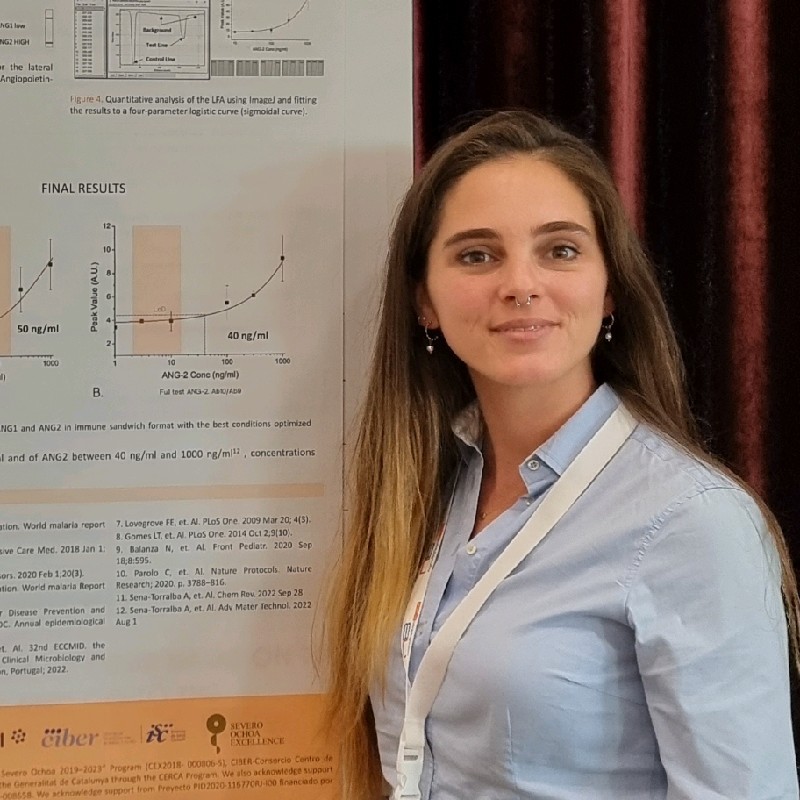- Durada
- November 2021-November 2024
- Coordinador
- Claudio Parolo
- Finançadors
- Ministerio de Ciencia e Innovación - Agencia Estatal De Investigación. Convocatoria 2020 de PROYECTOS DE I+D+i
In the context of personalized medicine, the SMART project aims at developing a new diagnostic tool able to precisely diagnose malaria at the point of care. Globally malaria is a life -threatening disease, affecting over 200M and killing over 400k people ever year. Although Europe has been declared free of malaria, nowadays is the most imported parasitic disease in Spain, with around 1000 cases per year and with a not negligible mortality rate of 1-3%. This numbers are almost unacceptable taking into account that exist a highly effective treatment (artemisin based combination therapies). Hence, the diagnosis is the key cornerstone of this disease, since a rapid and accurate diagnosis would lead to a prompt initiation of the treatment and consequently to avoid a huge number of deaths.
In the same lines, at the moment malaria can be precisely diagnosed just using laboratory-based techniques (i.e. microscopic and PCR techniques), which require days, specialized personnel and equipment. In addition, these requirements are scarce in endemic countries and are not totally implemented in Spain, leading to a delay in the treatment initiation since the patients must be transferred to reference units. Alternatively, the use of antigenic rapid tests do provide a quicker response, but their sensitivity and specificity often lead to false results and are in consequence far from being the gold standard technique. As a result, it is evident the lack of quick and reliable diagnostic devices that could overcome the mentioned weaknesses.
In response, we plan to develop a test able to combine the bioanalytical performance of laboratory-based tests with the speed and portability of rapid tests. In order to achieve this, we will first conduct a biomarker discovery study on samples obtained from 90 patients (divided into control group, as well as severe and non-severe cases) that attended the Hospital Clinic of Barcelona between 2015 and 2020. This study aims to select new biomarkers that comparing with the standard microscopic techniques, can perform as a reliable tool to diagnose malaria. Then, based on those results, we will develop new aptamer-based electrochemical sensors capable to precisely quantify in under 5 minutes the presence of those biomarkers in undiluted patient samples. Finally, we will incorporate the sensors into a convenient paper-based platform.
This is one of the first attempts to apply these techniques in the malaria field, and will provide the requirements above mentioned to improve the management of the disease, since the develop of the sensor and the platform provides both the portability required for its wide deployment (i.e. any health care facility or pharmacy) as well as a level of automation (thanks to the intrinsic capillarity of paper) that allows the use by non-trained personnel in any facility (e.g., travelers, airport workers , social institutions).
We believe that the SMART project has the potential to revolutionize the way we diagnose malaria, and therefore can have a great impact in the whole management of the disease, which would lead to decrease the number of deaths from malaria in Spain (and worldwide) as well as could protect travelers carrying the device with them.
Total funding
181,500 €
Proyecto PID2020-116770RJ-I00 de investigación financiado por MICIU/AEI/10.13039/501100011033
Our Team
Coordinator
-
 Claudio Parolo Associated Researcher
Claudio Parolo Associated Researcher
ISGlobal Team
-
 Jose Muñoz Associate Research Professor
Jose Muñoz Associate Research Professor -
DANIEL CAMPRUBI Assistant Research Professor
-
 Leire Balerdi Medical Research Fellow
Leire Balerdi Medical Research Fellow -
 Julia Pedreira Rincon Investigadora predoctoral
Julia Pedreira Rincon Investigadora predoctoral -
Qiuyue Yang Investigadora postdoctoral
-
 Helena Martí Bioestadística
Helena Martí Bioestadística
Altres projectes
Veure projectes passatsNHEPACHA
Noves Eines per al Diagnòstic i l'Avaluació del Pacient amb Malaltia de Chagas
RTS,S Vaccine Immunology Study
Study of immune correlates of protection against malaria after vaccination with RTS,S/AS01E: a comprehensive immunological arm of a Phase III double-blind, randomized, controlled multi-center trial
Euroleish.net
Control of Leishmaniasis. From bench to bedside and community
GREPIMER
Grup de recerca en patología importada i malaties emergents i re-emergents
TESEO
Nuevos regímenes de quimioterapia y biomarcadores para la enfermedad de Chagas
ASINTMAL
Unravelling Disease Tolerance and Host Resistance in Afebrile 'P. falciparum' Infections: a Prospective Study in Mozambican Adults
ADAM
Administración masiva y focal de fármacos antimaláricos para avanzar hacia la eliminación de la malaria en Mozambique: acelerando la implementación de programas y políticas
Science4Pandemics
Citizens engagement digital platform for collective intelligence in pandemics
HIDDENVIVAX
Novel organ-on-a-chip technology to study extracellular vesicles-mediated cryptic infections in Plasmodium vivax malaria
Subclinical Infections in Children and Long Term Health Effects
Infection acquisition in early life and health outcomes in childhood - MARATO TV3
Herramienta innovadora de detección de enfermedades y vacunación a población inmigrante en riesgo en España
Project Code: PI21/00651
Impacto de las coinfecciones en el balance de respuestas de anticuerpos y linfocitos T helper a antígenos diana de inmunidad natural y vacunal frente a patógenos humanos prominentes
Project Code: PI20/00866
EpiGen
Building Scalable Pathogen Genomic Epidemiology in Ethiopia
MalTransc
Transcriptional regulation of adaptation and developmental decisions in malaria parasites: from epigenetic variation to directed transcriptional responses
BOHEMIA
Broad One Health Endectocide-based Malaria Intervention in Africa
RESPONSE
Mechanisms of the transcriptional responses to changes in the environment in the malaria parasite Plasmodium falciparum
VivaxEVTalk
Extracellular Vesicles as Intercellular Communicators and Biomarkers of Cryptic Erythrocytic Infections in Plasmodium vivax malaria
VaMonoS
Unravelling the heterogoneity and function of monocytes in vaccination and immunity to malaria
CLIMSOCTRYPBOL
Insight on climate and social participatory research for integral management of vectorborne zoonosis caused by Trypanosoma cruzi and Leishmania spp. in the Bolivian Gran Chaco.
SexMal
Social affairs and sex in P. falciparum: implications for malaria elimination
MENA Migrant Health
Transforming data collection and surveillance to drive migrant health research, care and policy
MESA
L'Aliança Científica per a l'Eradicació de la Malària (MESA) té com a objectiu avançar en la ciència de l'eradicació de la malària.
GlycoTargets
Noves teràpies antimalàriques dirigides contra les vies de glicosilació de 'Plasmodium falciparum'
GenMoz
P. falciparum genomic intelligence in Mozambique





